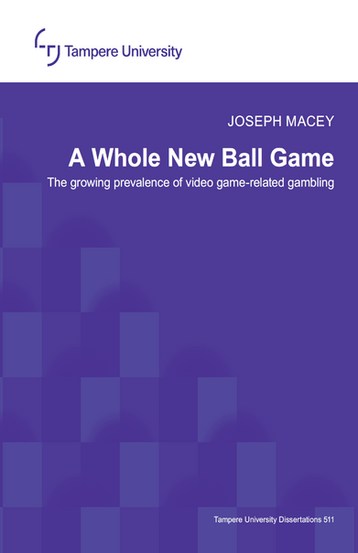Joseph Macey
Over the past decades, two parallel trends have emerged, the increased liberalization of gambling practices and the increased importance of games as entertainment media and cultural attractions. Due to these trends, the rapid convergence between video and gambling is therefore not surprising. During the process, traditional differences have increasingly blurred, created new functions and influenced the development of new kinds of social relations and consumption practices.
The convergence of gaming and gambling made possible by digital technology has received more and more attention in recent years also in the academic community, due to the rapidly growing social and economic effects of these digital media products. A lot of attention has been paid to in-game items, loot boxes, but there are many more examples of gambling-like mechanics to engage players and thus promote financial profitability. Developments like this have raised concerns and raised claims about the exploitative nature of the phenomenon, the normalization of gambling and gambling-like features, and the encouragement of problematic consumption.
While conducting this research, a significant lack of empirical research on video and gambling games emerged. Previously published research on the topic has mainly focused on issues related to the legal aspects of gaming and regulation. The aim of this dissertation is therefore to investigate gambling related to video games (such as e-sports betting, virtual lotteries and surprise boxes) and its connection to video game playing habits, erroneous beliefs and motives for consuming online services. This dissertation work is divided into a series of complementary perspectives, which together bring depth and breadth to the research.
This dissertation constitutes the first empirical study that focuses as a separate topic specifically on the examination of gambling related to video games. Earlier studies in this field have looked at individual practices, for example casino games played on social media (social casino games, SCG) or e-sports betting. In particular, it should be mentioned that the articles included in this work were among the first to discuss the role of surprise boxes and other virtual products as enablers of gambling related to video games. The subject has since received significant attention not only within the academic community, but also outside of it. In addition, this work forms a picture of a key era in the development of gambling related to video games,
While previous work has focused on studying video game players, e-sports followers, or gamblers, this work identifies for the first time individuals at the intersection of these groups: those who specifically engage in video game gambling. Special attention in this work has been to highlight the presence of minors in the ecosystem of video games and gambling. This group is often absent from similar studies, even though early exposure to gambling is known to be associated with increased risks.
Based on the topics described above, this dissertation contains one of the first studies that deals with gambling-related beliefs among video gamers who play gambling games. Based on the results of the study, the first measure was also developed to identify the beliefs in question among the players in question. At the same time, the results of the study provide information that can be used to improve already established measures of gambling-related beliefs in traditional groups of gamblers.
The theoretical and practical knowledge produced by this dissertation has greatly contributed to the understanding of the relationships between video game playing and gambling behavior. It is part of a series of studies that partly question the path theory's view of the direct contribution of playing video games to the development of problem gambling. Instead, this work emphasizes the importance of context, for example the influence of player communities and media forms. The importance of these connections for the development of gambling behavior is greater than just gambling.
All four articles included in this dissertation use quantitative methods to examine the phenomenon and achieve a high-level view. All articles are among the first empirical studies to examine video game gambling and its various manifestations. The studies create a foundation on which further research looking at the phenomena in question can be built, and they also serve as a record of activities and practices during the significant change that took place in the field.
PUBLICATION DETAILS
LANGUAGE | BINDING | EDITION | ISBN | YEAR | PAGES |
English | Paperback | 9789520321901 | 2021 | 236 | |
English | eBook | N/A | 2021 | 236 |
TAGS
Authors: #JosephMacey
Publishers: #TampereUniversity (Tampere University)
Languages: #English
Format: #Paperback #eBook
Accessibility: N/A
Year: #Year2021
Genres: #Esports #GameStudies
Companies:
N/A
Public Figures:
N/A
Games:
N/A
Misc:
N/A



Comentarios